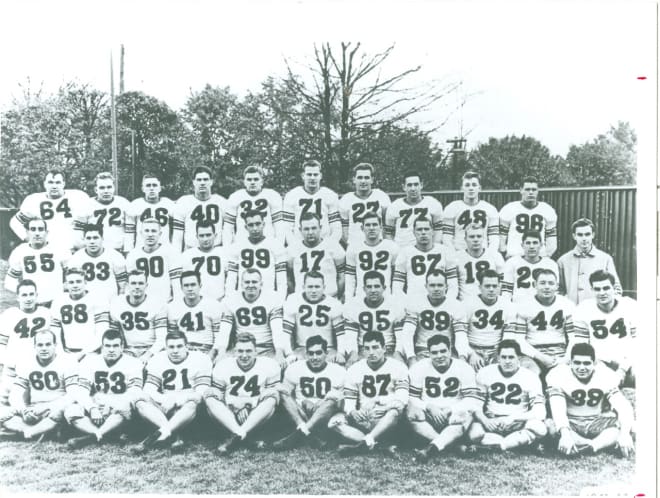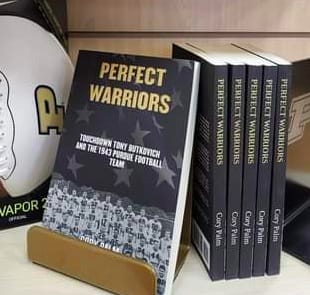Unbeaten and immortal: Story of 1943 Purdue 'Perfect Warriors'

This band of men assembled at Purdue in 1943 to train as soldiers for World War II. They left as football immortals.
They were “Perfect Warriors,” the apt title to a book that chronicles the exploits of an unbeaten Boilermaker football team played out against the backdrop of war.
"The more I learned about the team, how the team was constructed, what they accomplished, kind of like an onion, the more layers I peeled away, the more interesting stuff I found," said author Cory Palm.
Football was a diversion, a pastime for this mishmash of fresh-faced men who zigzagged the country to assemble in West Lafayette almost 80 years ago. Before they shipped off to save the world from the Axis, the players on the 1943 team forged one of the greatest Big Ten stories rarely—if ever—told.
“They were true heroes in every sense of the word,” said Palm, who has worked for 16 years in the Purdue athletic department. “Every one of them sacrificed their lives, their livelihoods, everything in order to join the Navy or join the Marines and then fight for something larger than themselves. They knew what it was all going to lead to.”
Certainly, Tony Butkovich knew. It was his exploits as a fullback that fall that sparked Palm's interest in this 1943 squad that time has largely forgotten. Specifically, Butkovich's 16 rushing TDs, which still stand as a school single-season record.
Butkovich arrived at Purdue from the University of Illinois with no intention of playing football—let alone becoming a legend.
He did both.
A bruising runner who was faster than you think, Butkovich was the unabashed star of a team that finished 9-0 and staked a claim as national champs.
“At the end of the season, Purdue was the only undefeated team in the country,” said Palm. “They had beaten the team (Great Lakes) that took down Notre Dame. But it was the ‘40s, so Notre Dame was recognized as the national champion, regardless.”
Purdue ascended to No. 1 in the nation after it toppled Wisconsin on Oct. 30. The Boilers won their last two games to cap a 9-0 season, going 6-0 in the Big Ten to earn a share of the conference title. Still, they eventually were passed in the poll by four teams with losses.
“It's completely nonsensical,” said Palm. “But that's kind of why we've always loved college football. It's never made a ton of sense.”
Butkovich didn’t even get to finish the season. Duty called. He was one of several Boilermakers who shipped off to Parris Island, S.C., for basic training with three weeks left in the season.
Butkovich’s legend was already etched before he left to fight in the Pacific Theater. The St. David, Ill., native broke the Big Ten scoring standard with those aforementioned 16 rushing TDs, a record tied by Kory Sheets in 2008.
“How come I've never heard of this guy?” said Palm one day while doing research in the athletic department during Sheets' push for the record. “So, I started looking and found a couple of small pieces that had been written about him through the years.”
A book idea was born.
"Touchdown Tony" Butkovich wasn’t the only All-American that dotted this unique 1943 Purdue roster. He was joined by fellow Fighting Illini Alex Agase, a tenacious guard who would go on to coach the Boilermakers from 1973-76. The team MVP was guard Dick Barwegan.
“The bulk of the team was here about five months,” said Palm. “A lot of them came from the University of Illinois. They came to Purdue because Purdue was one of the few schools in the Navy Officers Training Program that had training for the Marines."
Head coach Elmer Burnham was as unique as the squad he coached.
"He was only head coach here for two years," said Palm. "He was a fascinating character. He worked with and then was replaced by Johnny Wooden at South Bend Central High School as a teacher and coach."
Burham went 1-8 in 1942 before his roster was infused with players from places like Iowa, Missouri, North Dakota, among other locales.
"Burham didn't really like all of the things that went along with being a big-time football coach. He liked coaching. He liked working with young men and instructing them and he believed in sport, but he didn't think that it should be outsized. So, he took the job at the University of Rochester and became their all-time winningest coach. But they were a school that didn't give scholarships."
It was team full of fascinating characters, bright stars that burned quickly ... and who had a greater purpose beyond football.
Members of the ’43 Purdue achieved their top goal, helping fight back Germany, Japan and Italy to achieve victory in WW2. And, some paid the ultimate price. One of those was Butkovich.
“He got deployed and was killed in action on Okinawa,” said Palm. “He was going to come back to Purdue because he loved it here so much. But he never got the chance. He died April 18, 1945, just four weeks before Okinawa fell and a couple of months before the war was over.”
Cory Palm’s book is available on Amazon by searching for his name or book title. It’s available in paperback and Kindle versions. It's also for purchase at the University Book Store. Palm can be reached at cpalm@purdue.edu.

Membership Info: Sign up for GoldandBlack.com now | Why join? | Questions?
Follow GoldandBlack.com: Twitter | Facebook | YouTube
More: Gold and Black Illustrated/Gold and Black Express | Subscribe to our podcast
Copyright, Boilers, Inc. 2022. All Rights Reserved. Reproducing or using editorial or graphical content, in whole or in part, without permission, is strictly prohibited.

